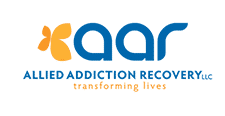Frequently Asked Addiction Questions
Below are multiple frequently asked questions (FAQs) that we’ve received over the years at Allied Addiction Recovery. All questions are important to us, so if you have one, but don’t hesitate to contact us.

At what point do you know that someone has recovered?
It’s important to know that no one is ever recovered. It is a lifelong process, it’s a journey for the individual to learn more about themselves, become more connected within their family, and have that process of therapy and counselling in place to help them make those changes. “Recovered” makes it sound like the journey is over and the changes that have occurred in a person’s brain are not going to change back. Those are things that the person’s going to have to deal with for the rest of their lives.
Is there any real hope for a better life for an addict?
Yes, there is! Because there’s so many resources to help support people now and to be able to gauge that treatment to just that specific person.
How does someone explain this to their kids?
It can be a very touchy subject but you have to assure the kids that this is not a bad thing and that this person is trying to get well. Mom and dad are trying to get help. This is an illness, this is a disease, this is something that a person will struggle with. And, they’re now trying to stop the hurt from happening again.
Are there support groups for family members?
Absolutely! There’s a lot of options and supports for family members. Al-Anon, Nar-Anon to name two. They can also attend a meeting of Alcoholics Anonymous, Narcotics Anonymous, to encourage and support their loved ones.
How long will they be gone once they’re admitted?
It really depends on the individual on how severe their problem is and what type of treatment is determined to be needed in order for them to remain clean and sober.
Is rehab affordable?
Rehab is affordable. Most major insurances have mandated coverage for drug and alcohol treatment and also there is county funding available for folks to get help.
What is rehab like?
Rehab is an opportunity for somebody to, in a safe place, talk about the issues that may have lead to their drinking or drug use and start coming up with the behaviors that they’re going to need to change in order to stay clean and sober.
Once I make the call on behalf of someone else, what happens next?
The first thing AAR will do is check them out medically to make sure they’re okay and can participate in all the therapy programs.
What if my friend says no to help?
You have two choices to make. One is to continue supporting the person, which could end up making things worse. Or, you need to make a decision about how to help protect yourself because their drinking or use is affecting you, too. The first step would be to give us a call at Allied Addiction Recovery to begin you on your journey for help.
How do you talk to somebody about their drug addiction?
Be absolutely honest with them about it. This is something that you’re seeing and you’re concerned about them. And, you don’t want to see things get worse for that person.
At what point is someone an alcoholic?
This is something for most people that develops over time, so what you’re going to see is problems with family, problems with work, and you start seeing more and more frequently negative consequences that occur specifically when somebody is drinking or using.
Can I still take benzos, smoke weed, etc.?
No. AAR’s philosophy is abstinence-based which means not using any mind-altering substances. If you are currently taking benzos, please talk with your prescriber about tapering off of them. We can’t write you a prescription for Suboxone (or equivalent) while you are taking benzos or test positive for benzos because of the risk of central nervous system depression that results in respiratory failure and possible death.
How long will I need to take Suboxone?
Best practices for medication-assisted treatment is between 18-24 months. Our goal is to begin tapering your dose slowly as soon as you and your therapist determine you are ready. We do not use Suboxone for long-term maintenance as our goal is to have our clients drug-free.
I can’t take Suboxone. Will you prescribe Subutex?
No. The only clients we treat with Subutex are those who are pregnant.
Can I get a prescription from AAR and do my counseling elsewhere?
No.
Does combining medication with individualized therapy goals greatly increase the odds of lasting success?
Yes! Do not be fooled by doctor’s that do not accept insurance and/or just write scripts for Suboxone or Subutex, offer Vivitrol injections, Naltrexone implants, etc. Medication alone is NOT ADDICTION TREATMENT. In PA, addiction treatment is highly regulated and only state-licensed facilities can provide addiction treatment. Taking medication without addressing a person’s addictive tendencies and learning strategies to manage the brain changes associated with addiction has a high failure rate. Medication helps stabilize a person, reduces cravings and increases the chances of maintaining recovery, but it is not a magic pill. The person will still need to work hard at recovery and personal change through individual and group counseling with experienced clinicians who will make a difference in your recovery.
How many days a week do I have to come? Can I come monthly?
If you are a new client, you will not be able to attend monthly. Individuals progress through addiction treatment at different rates. Your initial treatment level will be discussed and agreed upon during your intake. Keep in mind, research has shown unequivocally that good outcomes are contingent on adequate treatment length and intensity. Best practices in medication-assisted treatment (MAT) using tools such as Suboxone is between 18-24 months. Drug-free treatment or MAT occurring for less than 90 days is of limited effectiveness. Treatment lasting significantly longer is recommended for maintaining positive outcomes. Eventually, a person can become a monthly client as they near the end of successful participation. If a person is in MAT, this includes gradual medication tapering.
Do you do prior authorizations for medication?
Yes. Most health plans require pre-auths for treatment medications. More often than not, your health plan requires counseling in order to authorize the medication. As a client of AAR, we handle your treatment and medication authorizations.
Will you work with my schedule?
Yes, as best as we can. Please discuss your schedule with your therapist.
When do I see the doctor?
In most cases, you will see the doctor during the first appointment as part of the intake evaluation. If this is not the case, we will let you know.
